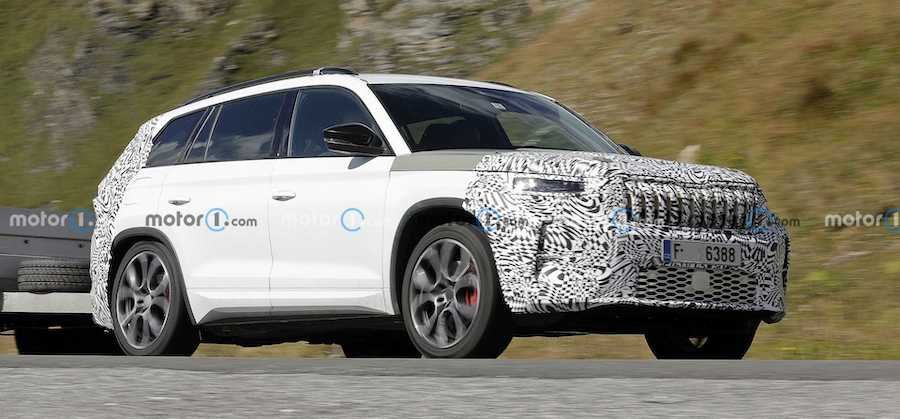Next-Generation Skoda Kodiaq Spied For The First Time As Test Mule

People who want the latest version of a certain vehicle have reasons to feel frustrated because an update is in almost all cases roughly three years away. If it's not a facelift, then it's the next-generation model. Case in point, Skoda unveiled the revised Kodiaq in April 2021 and these new spy shots are showing the Czech marque has already started testing the second-gen model out on the open road.
It’s still in its infancy since we're looking at an early test mule with the current body. It seems to be based on the hot Kodiaq RS judging by the 20-inch wheels, red brake calipers, and dual exhaust tips. As a refresher, the high-performance version lost its twin-turbodiesel engine with the facelift as Skoda decided to use the same 2.0 TSI borrowed from the Octavia RS and many other VAG products.
Caught hauling around a towing dynamometer, the next-gen Kodiaq had the hood painted in a different color compared to the rest of the panels. It also seemed to be sitting slightly lower to the ground at the rear axle compared to the front, but the vehicle itself appeared to be a standard issue for the most part. Previously, Skoda said a plug-in hybrid only makes sense for the Octavia and Superb as the electrified powertrains are popular with fleet buyers. That could mean a Kodiaq PHEV has been ruled out for the new model.
With this being a test mule, we're likely at least a year away from the official debut. When it does eventually arrive, the 2024 Kodiaq should have quite a few things in common with the next-generation Volkswagen Tiguan. Its fancier sibling will be out sooner since recent spy shots depict prototypes carrying the full production body. The duo is expected to feature the last generation of VAG's internal combustion engines, developed to meet Euro 7 regulations coming in a few years.
Elsewhere, the Mladá Boleslav automaker will extend its crossover lineup later this decade with a smaller electric high-riding model positioned below the Enyaq. It was recently previewed as the Vision 7S concept and will be one of the three EVs due by 2030, along with a city car and another model.
